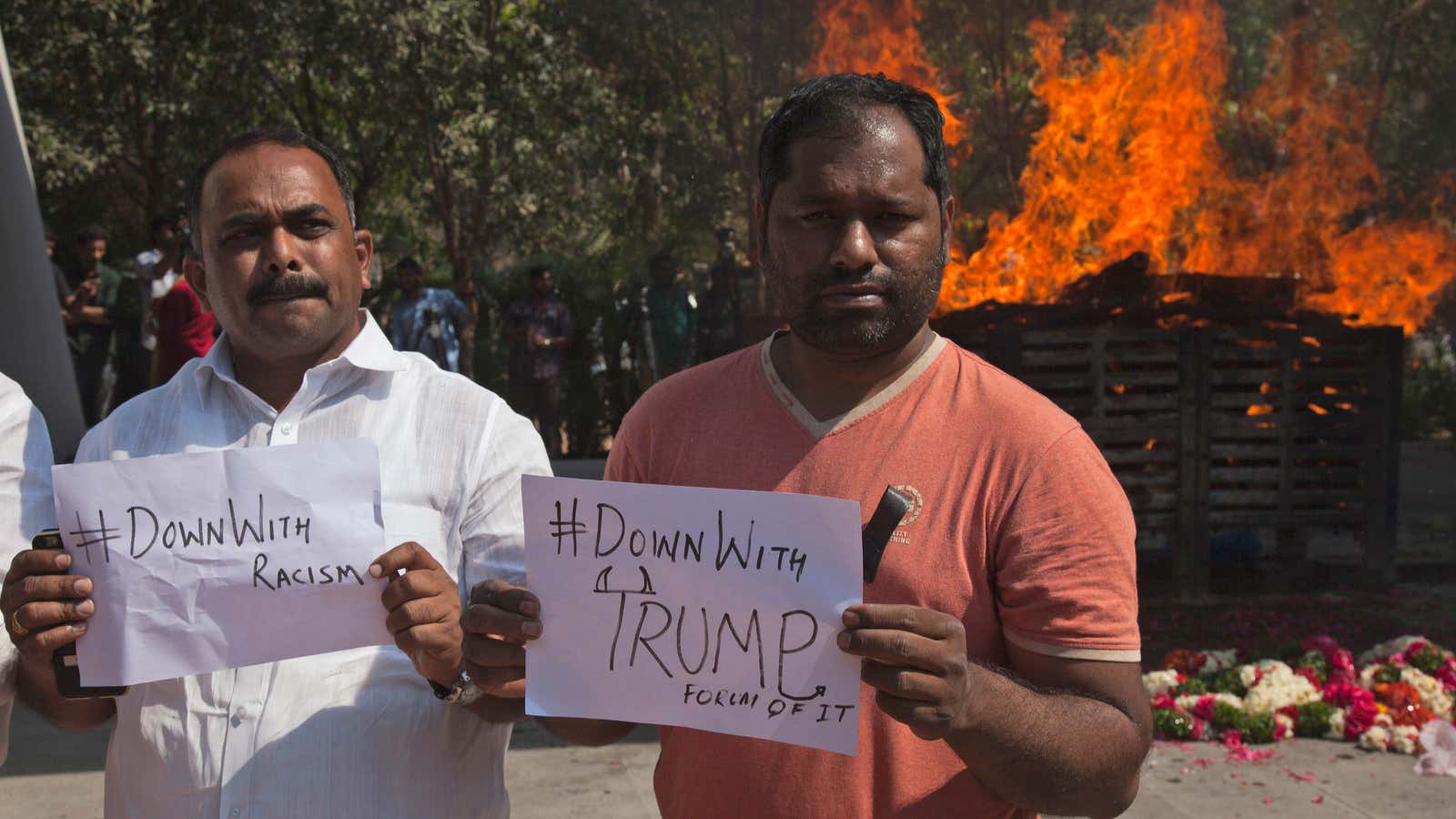US president Donald Trump knows how to play the American media. So long as the press focuses obsessively on his bombastic persona, he controls coverage. If Trump talks about Muslim terrorism, well then we write about it, whether in agreement or in opposition. Either way, he sets the agenda. If he doesn’t talk about acts of terrorism by right-wing radicals against Muslims or immigrants, or ignores a wave of bomb threats and anti-Semitic hate crimes, then we are more likely to stay silent, too.
When a white man walked into a bar in Olathe, Kansas, on Feb. 22 and opened fire on two Indian Americans, the president remained silent. It would take Trump’s administration almost a week to release a comprehensive statement regarding the shooting of Srinivas Kuchibhotla and Alok Madasani. Trump himself spoke about the attacks during his first speech to a joint session of Congress—six days after the shooting. In tandem, cable news networks devoted surprisingly little time to the killings. A Media Matters analysis of major networks showed that the attack was allotted very little airtime. Fox News spent less than a minute on the incident last week.
Many Americans are outraged in the wake of the shooting, pointing to a connection between Trump and his team’s own nationalist and xenophobic rhetoric and these crimes. They expect Trump to speak out more forcefully, or even to speak out at all. But here’s the thing: It wouldn’t matter if he did.
The hate speech and hate crimes that are spreading across America coincide with the rise of Trump. They reflect his speech and his actions. As such, to expect him to condemn xenophobia, racism, and anti-Semitism, and to expect that condemnation to have an effect on the perpetrators, is like looking to a radical imam to tamp down extremist sentiment.
We can’t look to a cause to end an effect.
Trump’s administration is, and will remain, deeply racist. Take counterterrorism adviser Sebastian Gorka, an anti-Muslim “huckster” with ties to anti-Semitic groups. Trump’s chief strategist Steve Bannon, whose apparent desire for civilizational war makes him a counter-jihadist jihadist, is often described as the real power in the White House. His proposed ambassador to Israel, David Friedman, once compared moderate Jews who oppose West Bank settlements to Holocaust enablers.
White supremacy is a part of his administration, and a part of his base. The more Democrats and independents turn on Trump, the more he’ll tack right—and the worse the hate crimes will get, leading to more moderate Americans shifting away from him, and encouraging Trump to rely ever more closely on the bigots in his camp.
Worse yet is the fact that this bigotry is not simply strategic. Trump isn’t just riding extremists to victory. He’s creating them. And a strategy of blaming minorities for economic ills and making up terrorist attacks while ignoring other kinds of violence will only spread more hate, fear, intolerance, and violence.
So instead of waiting for Trump to make a tepid statement, American minorities and their allies need to come together, now, and find ways to fight this type of homegrown extremism on their own terms. We cannot let Trump decide our agenda.
First, we must absolutely develop deep relationships across minority communities. White supremacists are dangerous precisely because they know exactly who they are and what they want to accomplish—and they have few moral constraints. For decades, they have targeted minority communities one after the other, plunging them into a general climate of fear, and exacerbating preexisting tensions between them.
The answer to this is sincere, respectful pluralism. Right now, for example, we see tremendous solidarity between many Muslim and Jewish communities, a surprising and welcome outcome. We must continue to work to solidify these sorts of relationships, so that they have the power to withstand outside political pressure. If the violence now rising in Gaza accelerates into full-blown war, and Muslims and Jews in the US begin to see each other as threats, than the supremacists in the White House will have won.
We can do this by agreeing to certain norms of disagreement: We pledge that we won’t use policy differences, cultural norms, or political positions to erase fundamental commitments to democratic values.
Second, we must not frame opposition to Trump as either opposition to his supporters, many of whom, I am sure, do not share his racist agenda, or even as a matter of political debate. Trump is objectionable not because he is a Republican, but because he is not a constitutional democrat. He does not seem to believe in checks and balances, secularism, pluralism, or common decency—all bedrock American values which we cannot allow to become partisan issues.
That means reaching out to build bridges across political divisions, not simply to ensure short-term, tactical wins, but also to create long-term relationships.
Third, we must stay vigilant and informed at all times.
Extremism affects all Americans, even if it doesn’t make the news. South Asians have known this for some time—just ask American Sikhs, who still experience upticks in racially motivated incidents following attacks in the US committed by Muslims.
While Trump continues to ignore hate crimes by the radical right, we have to do the opposite. We have to have a clear picture of what’s happening, so that we know what exactly we’re up against.
That can start here.
A terrorist killed Srinivas Kuchibhotla and injured his colleague, Alok Madasani. These are human beings. They had committed no crime. They had, and still have lives, loves, hopes and dreams. If the senseless violence committed against them would have received more attention had their killer been a Muslim or a person of color, and if they had been white, then shame on us.
